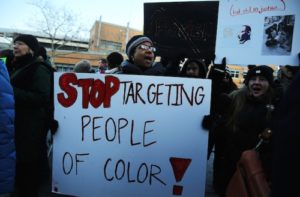
According to a study by Andrea Gómez Cervantes, a doctoral candidate in sociology at the University of Kansas, the intersection between legal status and race can make the experiences of illegality different for Latino indigenous versus non-indigenous groups. Immigration policies focused on racial profiling and criminalization of Latinos in the United States have direct implications on immigrants and their family members.
“Given today’s immigration enforcement increasingly rooted on racial profiling as a tactic to apprehend undocumented immigrants, indigenous-Latino immigrants, particularly those who have darker skin tones and shorter statures, are more easily targeted,” Andrea Gómez Cervantes said. “To add another dimension, many indigenous-Latino migrants do not speak Spanish or English fluently, leading to difficulty in gaining access to important information and resources.”
The study conducted interviews with 67 members of the mixed-status immigrant families and 18 months of ethnographic participant observation during 2016 and 2017, a period also coinciding with the presidential election. Respondents in the study, particularly those from indigenous families, mentioned fear of the new government, language barriers, anxiety of participating in public spaces and anguish over social institutions, including law enforcement and education, as threats to their abilities for their families to successfully integrate into U.S. society.
“There are ample variations amongst Latino groups including race/ethnicity, gender, sexuality and class, amongst many other social dividers,” Andrea Gómez Cervantes said. “Indigenous communities face ample marginalization and discrimination in their countries of origin, particularly in Mexico and Central America; therefore, upon arrival to the U.S. they may already be at a disadvantage.”
The report illustrates the experiences of living in a mixed-status family, and how the lived experience in the United States can be different for Latinos depending on whether someone in their family is from an indigenous or non-indigenous group. The study’s author believes this information will help voice the concerns of very marginalized groups, and aide in the construction of sound immigration policy.

Recent Comments